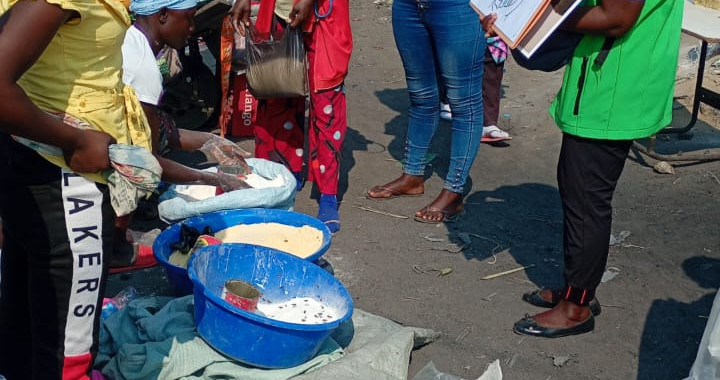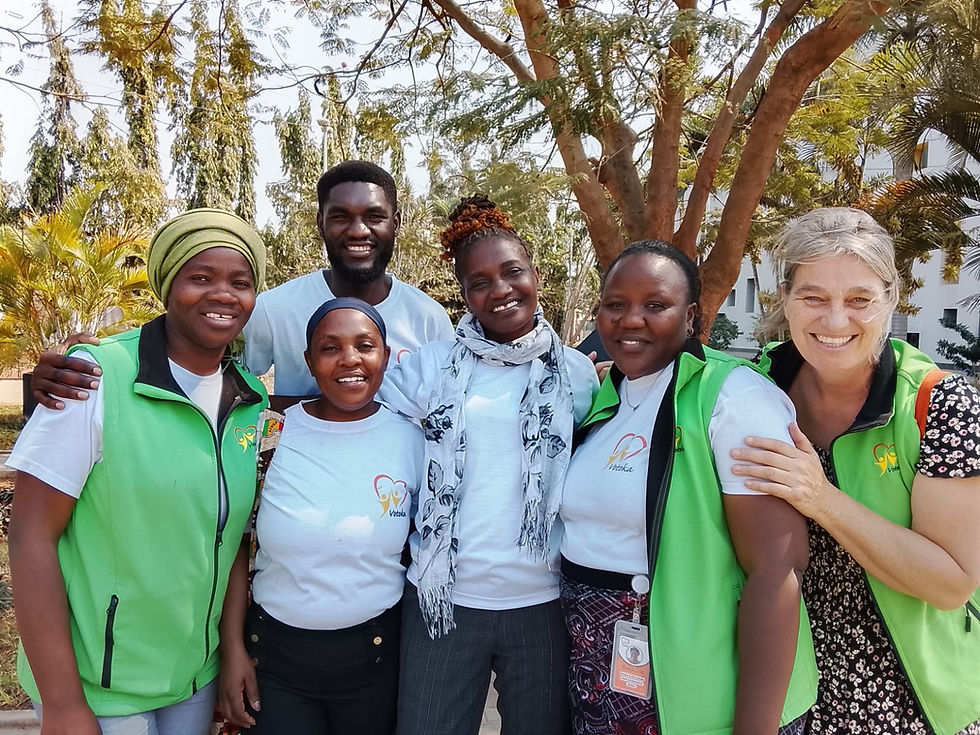Busy Little Bees!
- Mary Chimbili
- Sep 2, 2025
- 4 min read
Updated: Sep 5, 2025
For the last few months the Votoka team have been busy with 1. Post-operative nursing training; 2. Awareness raising activities; 3. Trauma and reintegration counselling; and 4. The ongoing support of patients being sent to our treatment partners for repair operations.
Post-Operative Nursing Care Training
In August we were blessed to receive a specialised training in Post-Operative Nursing Care for Fistula Patients from nurse Ishbel Campbell. Ishbel is part of the Uganda Childbirth Injury Fund (www.ucif.co.uk) and was funded to conduct this training by the Burdett Foundation for nurses. She is also the lead author of the FIGO certified book "Nursing Care for Women with Childbirth Injuries".
The training took place at the Fistula Treatment Centre in Luanda: Vangulula House at Azancot Maternal Infant Hospital. Nurses from Vangulula as well as three Votoka nurses received the training, with Votoka team members providing English-Portuguese translation. It was a fantastic opportunity for both the Votoka team and the Vangulula team to learn about best practice in post-operative care for fistula repair patients.
Prevention and Awareness Raising Activities
Our team of outreach workers have been going into the field and teaching about obstetric fistula in Bie, Huambo and Huila provinces. We have focused recently on the major marketplaces in different cities and towns - using bright, laminated A3 images and our team's oratory skills to share knowledge about the existence of obstetric fistula, how to prevent it, and to inform people that there are pathways for treatment. We have also spread the message at Catholic churches in Bie. The local Diocese of Bie were active in donating blood during the operations campaign in May, and asked for further teaching amongst their Parishes. Our team has also given awareness and prevention presentations at local hospitals. Our training coordinator Petra Jobse spoke at Kaluquembe Hospital in Huila, where Dr Priscila Cummings provides fistula repair surgeries and runs the House of Hope (Casa de Esperança). Team members Domingas and Salomé spoke at Hanga Catholic Mission hospital in Bailundo.
We believe that the more we can educate women (and men!) about obstetric fistula and how to prevent it, the greater our contribution can be to improve maternal healthcare outcomes. We can never put an end to obstetric fistula without investing in the prevention of fistula. Prevention begins with attitudes and knowledge, and is strengthened by a strong health system. Reaching the women in rural and peri-urban areas who are most likely to develop obstetric fistula is essential!
Trauma and Reintegration
Since July our Trauma and Reintegration team has been strengthened by the full-time presence of Margarida "Avozinha" in Luanda, providing trauma counselling and reintegration support to all the women who receive treatment there. Inspired by our partners from the Aftercare Program at CEML in Lubango, Avozinha has introducted basic literacy instruction as part of the Votoka Reintegration program in Luanda. We continue to prepare soy beans for the women who need extra support pre- and post-operatively. This is a huge job mostly undertaken by our logistician Vidal. It involves purchasing the dried beans, sorting them to remove rocks and other "rubbish", boiling them, drying them over a period of three days, taking them to be ground at the mill, then preparing the hot soy to drink. In Luanda Avozinha prepares the soy at her home and carries it to Vangulula in thermal bottles and distributes it to patients on a needs-basis. At our office in Huambo we also received members of the CEML Aftercare team for a training exchange. Petra conducted a training on prevention and awareness teaching, and the CEML colleagues described their program to us. Learning from each other, and strengthening each other, can help us to better help the women who suffer from obstetric fistula.
Sending Patients to Operating Locations
We regularly send patients to our operating partners in Luanda, Kaluquembe and Lubango. We endeavour, as much as possible, to send the women in groups accompanied by one of our team members. We believe this provides them with greater safety and helps to build a sense of community and comradeship. Furthermore, we always prepare our patients for travel by providing conditions for them to wash themselves and then providing them with adult diapers and a clean shirt and "pano" (African sarong). Just these simple actions of a shower and clean clothes can transform the women before they've even begun their journey. It provides self-confidence, it takes away some of the fear of travelling whilst incontinent, and helps them to raise up their heads and start to believe they deserve to be cared for. Since our training of traditional birth attendants in April, we have noticed an increase in patients referred by these midwives. Many midwives will travel with their patients to the meeting point, as they feel so strongly it is their duty to care for these women. Sending patients for treatment is a real team effort, and we rely on our network of Ambassadors, Midwives, Ex-patients, and the work of our Outreach and Awareness team.



































































Comments